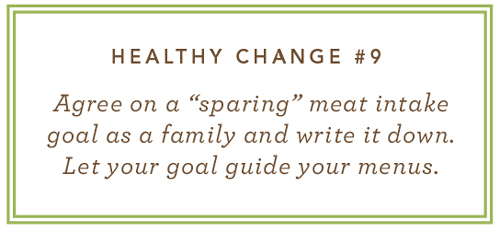The quick answer: Eat less meat—as in “sparingly”—but better. "Better" means pastured or wild-caught, with very little cured/processed meat.
_______________________________________________________________________

Meat Sparingly
A famous tome on eating—The Original Fannie Farmer 1896 Cook Book—included a month of dinner menus. Study shows the ideal 1896 meal consisted of meat in the center of the plate, accompanied by potatoes and gravy, an occasional vegetable, and a dessert. We were a meat-and-potato-eating nation with a growing appetite for sugar and an aversion to vegetables.
When fast food came along the main change was that meat came from a feedlot, potatoes were deep fat fried, and the sugar was in the drink. Ouch—trouble was on the horizon.
The Word of Wisdom prescribes a better meal: seasonal vegetables in the center of the plate, flavored by a little meat, washed down with water. It’s way healthier, and a better value.
Meat and Disease
The main killers of our time are heart disease and cancer. Is meat to blame? First of all, these diseases are multi-factorial—they have more than one cause, beginning with too much sugar. But meat is a factor as shown by these studies:
- A Harvard meta-analysis (a statistical methodology that combines the sum of many studies) put the biggest blame on processed meats (bacon, sausage, etc.). Each 50-gram daily intake of processed meat added 42% to your risk of heart disease.
- The long-term NIH-AARP study (focused on whites>50 years old) found a 20-60% greater risk for lung, colo-rectal, and other cancers from eating processed and red meats.
- Though we worry about pesticides on fruits and vegetables, meat is the primary source of harmful toxic dietary chemicals. Meat is especially harmful when charred, as often happens with BBQ.
- It’s not just about the meat. There seems to be a “meat-eaters” syndrome—meat eaters eat fewer fruits and vegetables, exercise less, are more likely to be overweight, etc.
The Meat Prescription
Science has revealed that you do need a little meat in your diet. Meat products contain nutrients not found in other foods:
- Omega-3 fats: These are essential fats (meaning your body must have them) and come in two groups: Short-chain (found in green plants, on land or sea) and long-chain (found in the creatures who eat plants such as pastured animals but especially cold-water fish). Your body can convert some short-chain to the long-chain forms but only a little, for good health you need meat products.
- Vitamin B-12: This vitamin (actually a group of cobalt-based vitamins) is essential to every cell in your body, especially the brain. Insufficiency of B-12 is common, especially in older people, and a factor in dementia, depression, and fatigue. B-12 is symbiotically produced by bacteria and found in animal products.
- Vitamin K-2: This family of vitamins, essential to processes like bone formation, is also found in animal product (bacteria produce it from K-1). It’s in hard cheeses, fowl and beef (especially in organ foods, including liver pate), and egg yolks. K-2 helps avoid osteoporosis.
Enjoy meat products sparingly, it’s good for your health and improves the taste of food. But do minimize intake of processed (or cured) meats. We love BLTs but probably average just one per month; ditto for sausage and cured hams.
What is "sparing"? I love this term because you have room for your own preferences. We keep animal protein under 5% of calories, 3-4 servings a week, including 1-2 fish portions. We also look for sources of pastured animal products and wild-caught fish.
Whole Food Plant Based
Depending on how you read the Word of Wisdom, meat intake can be “sparing,” mainly in winter, or only in times of famine (which may never happen in the U. S.). This brings us to a new book by Jane Birch, Discovering the Word of Wisdom. Birch’s book looks at the W of W from a “whole food, plant-based” perspective. The phrase “whole food, plant-based” usually means avoiding all meat products, what used to be called “vegan.” (You could be vegan and eat a lot of processed food so WFPB means whole foods.)
If you’re attracted to very little or no animal products in your diet, you might read Birch’s book, she has real passion for the subject.
Healthy Change #9
You can review the last two posts and the many reader comments here for 2012 and 2013.

Please comment: Share the ways you feature meat in your diet. Where do you find healthy meat? How do you use it as a condiment, rather than the main course? What do you do to show reverence for the Creation of animals?